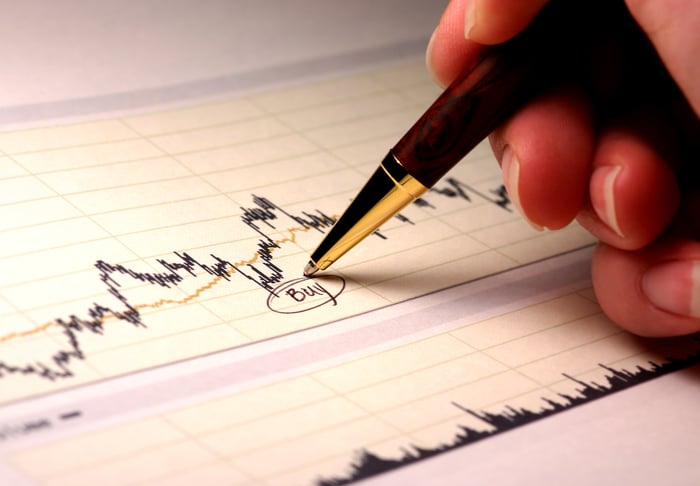Berkshire Hathaway (BRK.A -0.34%) (BRK.B -0.01%) CEO Warren Buffett is arguably the greatest investor of our generation. Since taking the reins as CEO in 1965, the Oracle of Omaha, as he's now known, has created over $740 billion in value for shareholders (himself included), and delivered an aggregate return for the company's Class A shares (BRK.A) of 4,100,820%, as of April 25, 2022.
There's no shortage of reasons for Buffett's success over the years. For instance, Buffett has an affinity for cyclical companies and dividend stocks, and has been willing to buy and hold high-quality businesses for decades to allow his investment thesis to shine.
However, Berkshire Hathaway's success also has to do with Buffett's lack of diversification. Despite his company holding stakes in nearly four dozen securities, Buffett has bet the farm on the following three stocks.

Berkshire Hathaway CEO Warren Buffett. Image source: The Motley Fool.
Apple
When it comes to betting the farm on a top-performing business, tech stock Apple (AAPL 0.64%) checked all the appropriate boxes for Warren Buffett and his investment team.
Apple accounts for more than 30% of the $104.6 billion cost basis of Berkshire's investment portfolio, and totaled nearly 44% of Berkshire's $339 billion in invested assets, as of April 25. On an unrealized basis, Buffett's company is sitting on a greater than $116 billion gain from its stake in Apple. It's also worth mentioning that Apple generates close to $799 million in dividend income for Berkshire Hathaway each year.
In Warren Buffett's eyes, there's little not to like about Apple. The company has an extremely loyal customer base, is one of the most recognized brands in the world, and is the hands-down leader in smartphone market share in the United States. In fact, the launch of 5G-capable iPhones sent Apple's sales and profits to record highs.
In addition to its success with tech products, Apple CEO Tim Cook is overseeing the promotion of subscription services. A subscription-driven model should alleviate the revenue lumpiness associated with product replacement cycles, and it has a good shot at lifting Apple's operating margins over time.
Furthermore, Apple has spared no expense with its generous capital return program. For some context, Apple returned $100 billion to shareholders just in fiscal 2021 (the company's fiscal year ends in September). It repurchased $86 billion in common stock, and returned more than $14 billion to its investors as a dividend. The Oracle of Omaha is a huge fan of businesses that reward patient investors.

Image source: Getty Images.
Bank of America
A second stock Warren Buffett has bet the proverbial farm on is money-center giant Bank of America (BAC 1.70%).
According to Buffett's 2021 letter to shareholders, Berkshire Hathaway had spent over $10 billion on just two securities: The aforementioned Apple, with a $31.1 billion cost basis, and Bank of America, with a $14.6 billion cost basis. As of April 25, BofA accounted for 11.4% of Berkshire's portfolio value, with Buffett and his investing team sitting on an unrealized gain of almost $24 billion.
The Oracle of Omaha is a huge fan of bank stocks, most likely because they're highly cyclical businesses. Buffett is well aware that recessions are a perfectly normal and inevitable part of the economic cycle. But he also knows that recessions only last for a few months to a couple of quarters. By comparison, the vast majority of economic expansions go on for years. Buying bank stocks like BofA is Buffett's way of playing a numbers game that strongly favors patient investors.
Another reason to be optimistic about Bank of America's future is its interest rate sensitivity. With the Federal Reserve looking to rein in historically high inflation with interest rate hikes, Bank of America is set to be a big beneficiary. According to the company, a 100-basis-point parallel shift in the interest rate yield curve is estimated to generate $5.4 billion in added net interest income over 12 months.
Bank of America's digitization efforts are paying off, too. The percentage of sales completed online or via mobile app hit 53% in the latest quarter, which was up from just 30% in the comparable quarter three years ago. Greater digital adoption is allowing BofA to consolidate some of its branches and improve its operating efficiency.

Image source: Getty Images.
Berkshire Hathaway
The third stock Buffett has bet the farm on isn't going to show up in the company's quarterly 13F filings with the Securities and Exchange Commission. That's because it's Buffett's own company, Berkshire Hathaway.
Prior to July 2018, Buffett and his right-hand man, Charlie Munger, were only allowed to repurchase shares of Berkshire Hathaway if its price-to-book value fell to or below 120% (20% or lower premium to book value). But in the six years leading up to July 2018, Berkshire's stock fairly consistently stayed range-bound between 130% and 160% of book value, leading to no share repurchases.
But things changed on July 17, 2018. Berkshire's board of directors passed new measures that gave Buffett and Munger the ability to repurchase their company's stock. As long as Berkshire has at least $20 billion in cash, cash equivalents, and U.S. Treasuries on hand, and the duo believe their company's shares are trading below intrinsic value, buybacks can commence without any cap. Since the midpoint of 2018, Buffett has overseen the repurchase of $58 billion worth of Berkshire's Class A and B shares.
Why repurchase so much stock? The primary answer is that it tends to have a positive effect on each remaining share. Since there are fewer shares left outstanding, businesses that grow their income over time can expect an earnings per share boost from repurchasing stock. This can make Berkshire Hathaway even more attractive from a fundamental standpoint and further lift its share price.
With Berkshire's Class A shares averaging a 20.1% annual return since 1965, buying back stock looks like a smart bet for the Oracle of Omaha and his shareholders.





